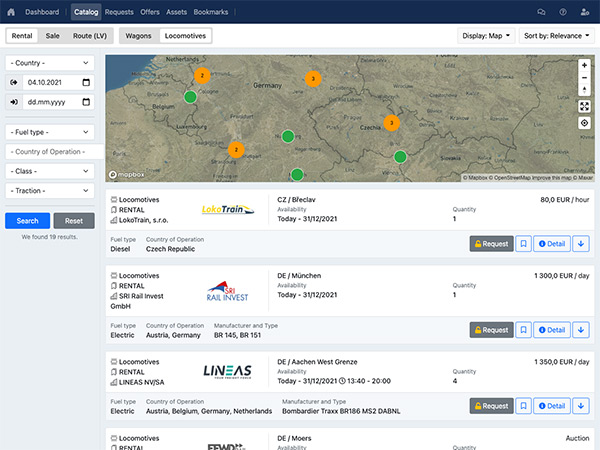RM: How the war in Ukraine and the energy crisis have changed the structure of rail freight of rail transport? What types of freight are now "on top"? Which commodities are are the most in decline?
Zbyszek Waclawik: Unfortunately, almost everything is in decline... After last year's boom in the transport of energy commodities, especially lignite, coal and liquid fuels, triggered by uncertainties about Russian gas supplies, there has been a significant decline in their transport this year. Industry is also struggling and car production has still not reached the levels of previous years. The situation in the metallurgical sector is uncertain, and the ongoing bark beetle disaster and pricing policy in the timber trade have led to a significant drop in timber shipments. Combined transport, especially maritime transport, has still not recovered from the Covid-19 pandemic, and I could go on.
RM: What specific measures is ČD Cargo taking to meet the current challenges in the freight market? For example, how is the company dealing with increasing competition?
Zbyszek Waclawik: We need to be a strong and stable partner for our customers, who can always rely on us to deliver their goods in the required quality and at the right price. That's why we continue to invest - we are buying new locomotives, investing in intermodal wagons and we will be ready for ETCS. Of course, we are also taking steps to make transport more efficient. This is also part of the answer to how ČD Cargo is coping with growing competition. We are also significantly expanding our territorial scope - we already have the necessary certificates to operate rail freight transport in seven European countries in addition to the Czech Republic. At present, we operate on the networks of all neighbouring countries and Croatia, which enables us to provide complete transport from the Adriatic to the North and Baltic Seas. I can confirm that this strategy is bearing fruit: in Austria, for example, our market share rose from 1.7% to 3% last year, and we are now the sixth largest carrier there.
RM: Could you explain the key aspects of ČD Cargo's strategy for further development and expansion on the market? Does the company focus on specific sectors or areas where it sees the greatest potential for growth?
Zbyszek Waclawik: I mentioned this in part above. We are building our future on four strategic pillars - interoperability, intermodality, international expansion and social responsibility. As for the second part of your question, I think that the sectors with potential must be the focus of any company thinking about its future. For us, this means, for example, participating in waste transport projects, in biomass transport. We want to continue to be partners with construction companies that are modernising railway infrastructure. In the management of the company, we see the future in closer and more effective cooperation with road hauliers.
RM: You recently celebrated one year as the commercial director of ČD Cargo. What are your personal ambitions and what would success mean at the end of this difficult year 2023?
Zbyszek Waclawik: One ambition that has already been fulfilled was to increase fuel shipments. My team has achieved this. And as far as the end of the year is concerned, the goal is still to meet the plan, but unfortunately the market situation is not helping us very much. But I mentioned that at the beginning of the interview.
RM: You are not a newcomer to ČD Cargo, you have developed its business activities mainly in Poland. How do you see the development of ČD Cargo over the last 15 years?
Zbyszek Waclawik: If we are talking about the 15-year horizon, then of course I am most positive about the spin-off of the freight transport business from ČD into a separate joint-stock company, which took place 15 years ago. During this time, the company has gone through a turbulent development. I appreciate, for example, the leap in IT technology, we have new interoperable locomotives and we are developing transport on a pan-European scale.
RM: At the recent ŽESNAD conference, there was a lot of discussion about getting freight back on the road. But the European objectives are exactly the opposite - to get freight off the roads and onto the railways. Why do you think this is not happening?
Zbyszek Waclawik: Unfortunately, there are several reasons. One of the most important is the de-industrialisation of Europe and the resulting decline in demand for the transport of bulk substrates and other goods associated with industrial production. Another is the changing nature of freight transport and logistics in general. In particular, the development of e-commerce is gradually decentralising distribution networks, which are much better suited to road transport. Last but not least, there is the insufficient capacity of some lines and hubs, such as the completely inadequate rail link between the Czech Republic and Germany, which depends almost exclusively on the congested Děčín-Bad Schandau line. Urban logistics are also still in their infancy in the country.
RM: What is your vision for the future of freight transport and what role do you see for rail in this vision? Can you give us some examples of specific areas where you see potential for rail over other modes?
Zbyszek Waclawik: The future of rail freight lies in the development of intermodal transport, both maritime and intercontinental. I still see a lot of potential in the second area in particular. Rail can play a much bigger role on a pan-European scale, as we see for example in North America. The development of inland intermodal transport is also probably the only way for rail to participate in the decentralised distribution and transport networks I mentioned earlier. The two modes must learn to work together much better and exploit their advantages.

